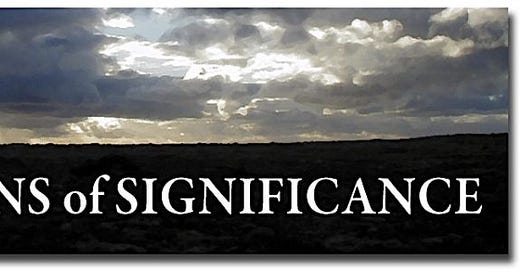There's a critical piece missing from the last post. That is, what does political failure entail?
If we look at it from within the assumptions of "the game," the conclusion that what is needed and inevitable is a grand failure will be misunderstood. Saying that any one leader, any one party should fail, is just a repetition of business-as-usual.
What is at stake here is a colossal failure of the entire notion that power and control can do anything for anyone besides lead to destruction commensurate with its means.
What we need to witness, and barring a premature individual death will witness, is the compounding of "unintended consequences" and the mounting toll of corruption. What needs to be seen is not what this does to its "victims," as horrible as that is; but what it does to its practitioners.
Power is a fool's game. We need to see that play out. Especially, we need to see its effects on those who wield it.
Power, the pursuit of it, the acceptance of its horrible logic, erodes the strength of any who follow its demands to their bitter end.
The nightmares of reason rear their terrifying heads.
*
I can still remember the moment when, in 1976, reading Lewis Lapham's Harper's Magazine, an article on the Northrup F-5 fighter being passed over by the U. S. Air Force. When I realized a lesson Lapham was vainly trying to explain to the power elites of the American Century. Fearful weapons only "work" when we don't try to use them for their intended purposes.
This may sound like MAD. It's not.
MAD uses nuclear weapons to maintain a global terror, but it doesn't rely on magic. These weapons generate and proliferate and spread real death, whether fired in some Strangelove-ian wet dream of culmination or left rusting in their silos.
Useful weapons, as every "primitive" people has always known, rely on magic. They have little power beyond the belief they instil in an opponent that their wielder cannot be defeated.
Lapham argued in those days that the U. S. had been in a position once – arguably at the point right after the second world war – when it had that magic.
Then, political leaders, and the arm-chair generals the peace created, began to believe in their own power. They began to use these magic weapons. Not the nukes, which are not magic, just Shiva unleashed, Destroyer of Worlds. No, they used their tanks, their planes, their rifles, the aura of the "GI."
And every time they did, two things happened. The magic rubbed off. The victories were indecisive – in Korea – and later, victory was rebranded as what we call it when we stop fighting a particular battle and go home. That's one thing, the other was that the battles which had begun as fights with some "other," became increasingly to be battles with our selves.
Chicago '68. Now Istanbul, and São Paulo….
An escalation of who the "other" is. The ultimate end of the nightmare of this particular form of reason. The form that bred "hearts & minds," and "destroying a village to save it." In the end, we are the ultimate other. We arrive at the point where in fits of paralyzing fear and numbing anxiety the ones with the most guns, the most power, the ones who have always seen themselves as winners, cower behind lines of Choque Troops. Not defending the "Homeland" against foreign invaders, but protecting themselves from us.
To be clear, this "us" is not some band of renegade Anarchists!®
This us, is the people, the living creatures on this earth. This us, is life itself.
Those who staked their success on their fearsomeness are now increasingly afraid of their own shadows.
That turn of phrase is no mere Jungian slip.
This is the end of reason. It leads to a belief in "our" projections as the only truth. It was as true for the power-mad wielders of the Inquisition dealing death "In God's Name," as it is of any overgrown "Trekker," spreading fantasies of a Galactic Federation across the ruins of our world. Once we have fallen for our own thaumaturgy, it is just a brief slide down to this point, where the powerful are merely pathetic.
We are at that point.
We have been here before. We tend to think of this, from reading histories written by and for the winners, as the precursor of Revolution®.
What has never sunk in before is that seeing it that way is how a gang of precocious adolescent boys playing at war see the world. A "power vacuum" can, in their eyes, only be of use as a chance to seize the reigns for one's self.
These scrambles have always led us deeper into the nightmares of reason. Each revolution's terror outdoing its predecessor in magnitude and scope.
The powerful are entering the bunker their fears and their adoration of power built for them.
*
"Duran Adam." What a powerful talisman this is. Just the words, half-understood, resonant with a deeply shared history.
Is this something new?
We are conditioned to seek novelty. We worship innovation.
Creativity is something else. Is this a creative response?
Will it succeed?
Two very different questions.
It appears to be a creative response. It is dialogue and witness distilled to an essence. It is disarming.
Will it succeed?
That is a stupid question. Leading us back into the same trap with different leaders/masters.
Something like this does need to happen.
When the powerful retreat into their bunkers. What if instead of fighting them we just watched?
Disarming their reaction. Short-circuiting them for once. Removing any "justification" for further uses of power to "defend themselves."
Their projections reflecting off a neutral mirror. There is no other way for anyone to finally see for themselves.
All this is too new to tell. It also begins to smack of mythologizing. Creating heroes that begin to mistake their magical roles for personal power.
*
What must be clear. The failure needs be total. Self-inflicted. Memorable.
It cannot be met by an army of willing volunteers for the role of scapegoat.
Its ownership must be unequivocal. As clear as its message:
Power destroys. Control only kills.






